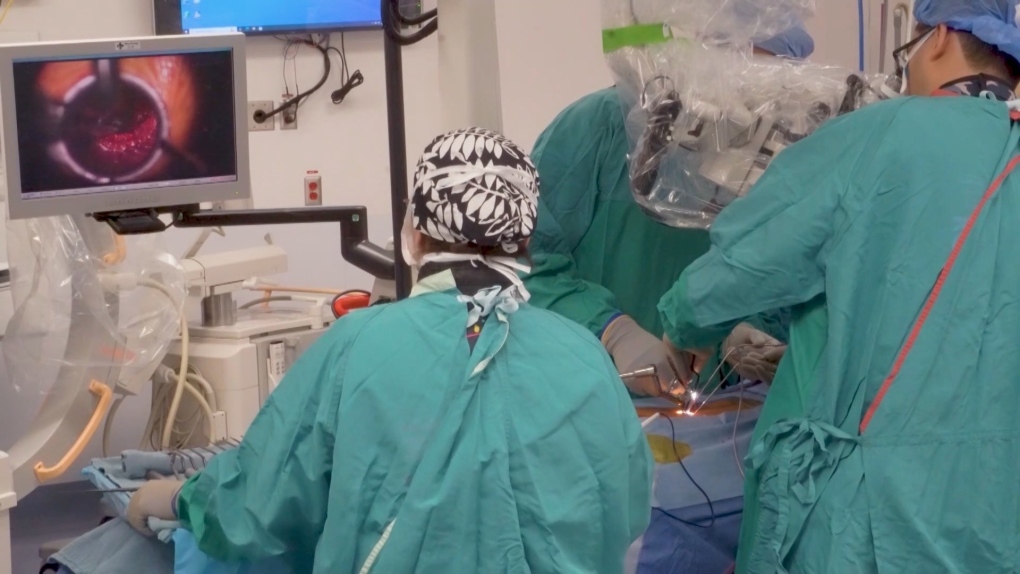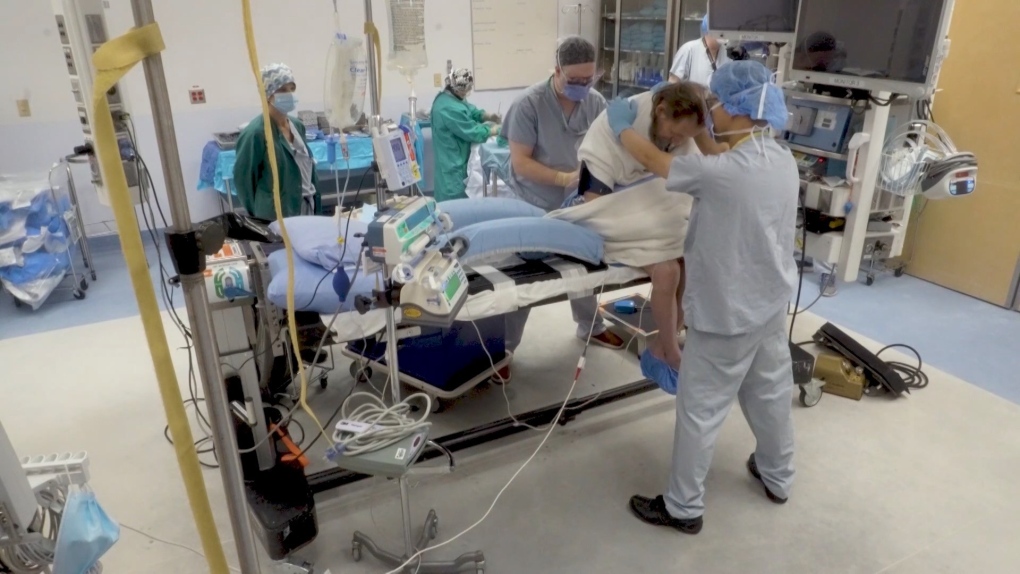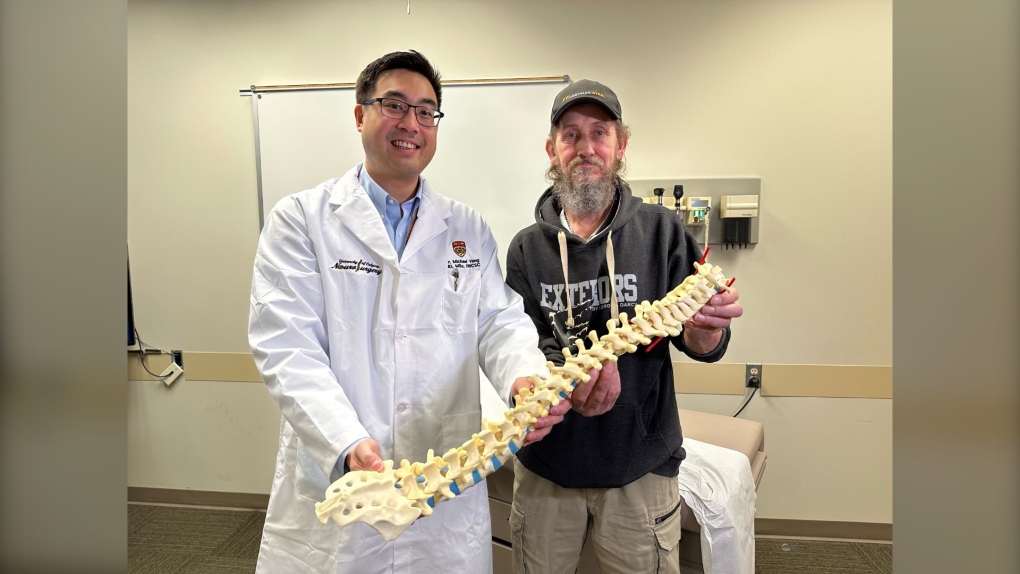Calgary doctor performs spine surgery on conscious patient
 Todd Bene, who has been dealing with chronic lower back and leg pain, was wide awake for a discectomy to remove the damaged part of a herniated disc.
Todd Bene, who has been dealing with chronic lower back and leg pain, was wide awake for a discectomy to remove the damaged part of a herniated disc.
(A previous version of this story stated this procedure was believed to have been the first of its kind performed in Canada, based on information provided by Alberta Health Services. That belief was genuine, but incorrect – spine surgery on awake patients has been performed previously in Canada over the years, albeit infrequently. CTV Calgary has revised this story and apologizes for any confusion caused.)
A Calgary doctor who recently performed a spinal surgery on an awake patient hopes to expand this technique in Alberta to ease pressure on the health-care system.
"This is just the first step of a long journey that we have, the plan that we have to help more Albertans," said Dr. Michael Yang, a spine surgeon at Foothills Medical Centre.
Last month, Yang performed a discectomy to remove the damaged part of a herniated disc in the spine, on a patient who was conscious.
Todd Bene, the man on the operating table, got the surgery to relieve his chronic lower back and leg pain.
"I thought, well, I'll try anything once," he said. "It was kind of cool. You know, I didn't feel much. Every once in a while, you would feel a little something."
 The surgery took about 55 minutes and Todd Bene was able to go home less than five hours later.
The surgery took about 55 minutes and Todd Bene was able to go home less than five hours later.
The surgery took about 55 minutes and Bene was able to go home less than five hours later. The next day, he was up cooking breakfast for his grandkids and even made a trip to IKEA.
"It was just night and day for the pain," he said. "I was just so surprised when I got up the first time after the surgery and also standing up straight."
Bene had a previous heart attack, heart failure and coronary artery disease, so Yang thought putting him under general anesthetic would be too risky.
Instead, he chose to perform the surgery without it and only with a local anesthetic — something he learned while studying at the University of Miami.
"The patients have less pain after surgery, less nausea, less vomiting after surgery. Patients are able to get up much quicker and walk around and thereby, facilitating their recovery," Yang said.
"Also, without general anesthetic, it causes less stress on the heart and lungs, so there's less risk of developing complications during the operation."
 Todd Bene, who has been dealing with chronic lower back and leg pain, was wide awake for a discectomy to remove the damaged part of a herniated disc.
Todd Bene, who has been dealing with chronic lower back and leg pain, was wide awake for a discectomy to remove the damaged part of a herniated disc.
The surgical team and neuroanesthesiologists worked together to sedate Bene just enough so it wouldn't hurt and he'd be able to communicate if it did.
"So we minimize the harm that we could potentially cause on a patient during the surgery," Yang said. "The surgery itself is not super innovative, but it's putting a team together to be able to do it awake that is innovative."
Yang says he plans to perform more procedures, and hopes to use this method for more complex surgeries, like spinal fusions.
He says spinal fusions, surgery to connect two or more bones in any part of the spine, typically require a two-to-three-day hospital stay, but with this method, the patient could go home the same day.
"This can really help reduce health-care utilization while maintaining excellent outcomes for our patients and be able to help more Albertans get the surgery they need in a more timely fashion," Yang said.
 Dr. Michael Yang hopes the surgery on Todd Bene will create opportunities to perform more complex surgeries — like spinal fusions — using this technique.
Dr. Michael Yang hopes the surgery on Todd Bene will create opportunities to perform more complex surgeries — like spinal fusions — using this technique.
However, Yang warns "awake surgery" isn’t for everyone. He advises against doing it on patients who are obese, have anxiety or require a longer surgery because there can be more risks.
Meanwhile, Bene has been off work for six weeks and is about to start physiotherapy. He has advice for other patients:
"Just don't be scared of it. It'll change your life."
CTVNews.ca Top Stories

How quietly promised law changes in the 2024 federal budget could impact your day-to-day life
The 2024 federal budget released last week includes numerous big spending promises that have garnered headlines. But, tucked into the 416-page document are also series of smaller items, such as promising to amend the law regarding infant formula and to force banks to label government rebates, that you may have missed.
Which foods have the most plastics? You may be surprised
'How much plastic will you have for dinner, sir? And you, ma'am?' While that may seem like a line from a satirical skit on Saturday Night Live, research is showing it's much too close to reality.
opinion I've been a criminal attorney for decades. Here's what I think about the case against Trump
Joey Jackson, a criminal defence attorney and a legal analyst for CNN, outlines what he thinks about the criminal case against Donald Trump in the 'hush money trial.'
$3.8M home in B.C.'s Okanagan has steel shell for extra wildfire protection
A home in B.C.'s Okanagan that features a weathering steel shell designed to provide some protection against wildfires has been listed for sale at $3.8 million.
Diver pinned under water by an alligator figured he had choice. Lose his arm or lose his life
An alligator attacked a diver on April 15 as he surfaced from his dive, nearly out of air. His tank emptied with the gator's jaws crushing the arm he put up in defence.
Psychologist becomes first person in Peru to die by euthanasia after fighting in court for years
A Peruvian psychologist who suffered from an incurable disease that weakened her muscles and had her confined to her bed for several years, died by euthanasia, her lawyer said Monday, becoming the first person in the country to obtain the right to die with medical assistance.
Mystery surrounds giant custom Canucks jerseys worn by Lions Gate Bridge statues
The giant stone statues guarding the Lions Gate Bridge have been dressed in custom Vancouver Canucks jerseys as the NHL playoffs get underway.
Celebrity designer sentenced to 18 months in prison for smuggling crocodile handbags
A leading fashion designer whose accessories were used by celebrities from Britney Spears to the cast of the 'Sex and the City' TV series was sentenced Monday to 18 months in prison after pleading guilty in Miami federal court on charges of smuggling crocodile handbags from her native Colombia.
Wildfire leads to evacuation order issued for northeast Alberta community
An evacuation order was issued on Monday afternoon for homes in the area of Cold Lake First Nation.
































